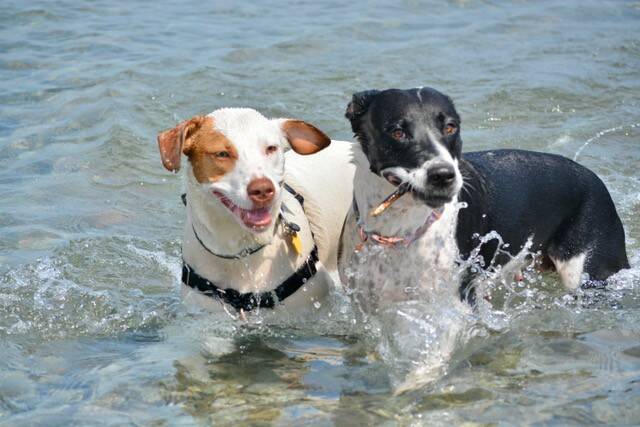Resources

Jennifer Reed CTB ccs. IPDTA-CDT


BECOME A CERTIFIED POSITIVE DOG TRAINER/BEHAVIOUR THERAPIST
Canine Correspondence Studies With Norma Jeanne
Email: NormaJeannes.DogTraining@mail.com
www.DogTrainingCareers.com
705-917-3647
The Blue Collar -Chris Walker 905-519-9948 thebluecollar25@gmail.com
Pet Grooming And Natural Food & Treats 189 King St. East, Hamilton

SUMMER FUN!
5 Things I Wish My Owner Knew..
1. I Need Routine & Structure
- Walks, meals and training at consistent times make me calmer
- A steady routine reduces stress and bad behaviour
2. Exercise Isn't Optional
- A bored dog is a naughty dog
- Daily walks and play keep my body fit and my mind sharp
3. I Understand More Than Words
- Tone, body language and consistency matter
- Clear cues (not yelling) help me learn faster
4. I Need Boundaries AND Love
- Rules keep me safe and help me feel secure
- Positive reinforcement builds trust- I respond best when you reward what I do right
5. My Walk is my adventure
- Sniffing, exploring and meeting other dogs are how I experience the world.
- Please give me the time to enjoy, not just rush!
Dogs’ Extraordinary Sense of Smell and Human Emotion
The Science Behind Dogs’ Ability to Detect Human Emotion
Dogs possess an incredible sense of smell that allows them to perceive the world in a way that is as rich and complex as human sight. Unlike humans, who often rely on facial expressions and tone of voice to interpret feelings, dogs are able to detect human emotions using scent alone.
Chemical Changes and Emotional Odours
When a person experiences emotions such as joy, fear, or sadness, their body chemistry undergoes subtle changes. Hormones shift, and these changes lead to the production of odours from the skin and breath. These odours carry invisible traces of emotion, which dogs are able to pick up through their heightened sense of smell.
Scientific Experiments: Dogs Respond to Emotional Scents
Experiments have demonstrated that dogs react differently depending on the emotional state of a person, as detected through scent. For example, when dogs were exposed to sweat samples from individuals experiencing fear, their heart rates increased and they sought comfort from their owners. In contrast, when they smelled samples associated with happiness, the dogs appeared more relaxed and became more social.
Beyond Identification: Emotional Perception Through Scent
These findings reveal that dogs’ sense of smell extends far beyond simply identifying objects or locations. It enables them to perceive human emotions directly, through the chemistry in the air. This ability means dogs do not need to see a person’s facial expression or hear their voice to understand how they are feeling.
Empathy and the Human-Dog Bond
The remarkable connection between humans and dogs may be rooted in empathy that travels through the air itself. Dogs’ ability to sense emotional changes chemically strengthens the bond shared with their owners, fostering an understanding that goes beyond words or gestures.
-Most relaxing facts about animals- Sleepy Science Channel

Housetraining Your Puppy: A Simple Guide for Pet Owners
Housetraining your puppy might seem like a challenging task at first, but with patience, consistency, and positive reinforcement, your furry friend will learn in no time. Start by establishing a regular routine, as puppies thrive on structure. Take your puppy outside frequently, especially after eating, drinking, waking up, or playing, and always bring them to the same spot to help them associate it with bathroom time. When your puppy successfully goes outside, reward them with enthusiastic praise or a small treat to reinforce the behaviour. Accidents inside are inevitable, so avoid punishment and instead clean the area thoroughly to remove odours that might encourage repeat incidents. Crate training can also be an effective tool since dogs instinctively avoid soiling their sleeping space. Remember, patience is key—every puppy learns at their own pace. With time and a dependable routine, your puppy will grow into a well-trained, happy companion.
Please message/email for a FREE detailed handout!